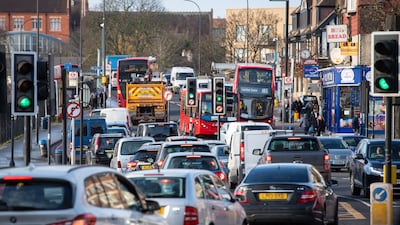Widespread 20mph (32kph) speed limits make London the world’s slowest city centre for drivers, according to new analysis.
Location technology company TomTom found journeys of 10km in central London took an average of 37 minutes and 20 seconds last year.
London is top of the slow city centre ranking for the second year in a row.
It is one minute slower than in 2022 and takes the longest time to travel among the 387 cities across 55 countries analysed.
A representative of London Mayor Sadiq Khan described the study as “misleading”.
In second spot was Irish capital Dublin, with 10km trips typically taking 29 minutes and 30 seconds.
It was followed by Toronto, Canada (29 minutes); Milan, Italy (28 minutes and 50 seconds); and Lima, Peru (28 minutes and 30 seconds).
In the UK, Manchester was ranked second (23 minutes and 30 seconds), followed by Liverpool (22 minutes and 50 seconds), Bristol (22 minutes and 40 seconds) and Edinburgh (21 minutes and 30 seconds).
Travel times increased last year in 21 of the 25 UK cities analysed.
TomTom based its analysis on journeys in a 5km radius of city centres.
How to drive to save petrol – in pictures
“London really is the slowest place in the world to drive a car,” Stephanie Leonard, the company’s head of government and regulatory affairs, said.
“Especially in the core city centre, you don’t have maximum speed limits of 50mph or higher, it’s a maximum of 20mph.
“You don’t have the infrastructure for driving very quickly.”
Transport for London lowered speed limits to 20mph on a further 65km of roads in the south of the capital during the final four months of last year.
When the measure was announced in September, the transport body said it would bring the total length of roads with a 20mph limit to 140km, making them “safer for everyone”.
“This study is misleading as it only includes analysis from a very small part of the city centre, not the whole of London," Mr Khan’s representative said.
“Comprehensive TfL data suggests that journey times on the TfL road network actually remain at similar levels to those in 2019, while analysis from around the UK suggests that lower speed limits have not increased congestion.
“Roadworks are the biggest cause of congestion in cities, which is why the mayor’s infrastructure co-ordination service is working with boroughs and utility companies to reduce delays caused by roadworks, helping to save London road users over 1,250 days of roadworks since 2019.”
Transport for London's director of network management Carl Eddleston said: “We disagree with this analysis of road speeds and believe it is not representative of London as a whole.
“This report only looks at data collected up to 5km from the centre, regardless of the city’s overall size and density, which means that fair comparisons with other cities cannot be made.”
In October last year, the government published a Plan for Drivers which included an intention to curb the use of those limits.
“We will make it clear that 20mph speed limits in England must be used appropriately where people want them – not as unwarranted blanket measures,” it stated.
This came a month after Wales became the first country in the UK to drop the default speed limit from 30mph to 20mph on residential roads and those commonly used by pedestrians.
TomTom found that as well as London’s city centre roads being the world’s slowest when traffic is flowing freely, they are also where motorists lose the most time due to congestion.
The study also noted that London had the world’s third highest fuel prices last year.
“Our analysis of the economic impact of congestion showed that London’s slow-moving traffic and higher fuel consumption made it one of the most expensive cities in the world for driving,” Ms Leonard said.
“Avoiding peak hours could save Londoners up to £187 ($238) per year on fuel costs.
“At the same time, local authorities must put support behind programmes that encourage cycling, public transport and other modes to take a larger share in transportation.”
TfL and Mayor of London Sadiq Khan were approached for a comment.








